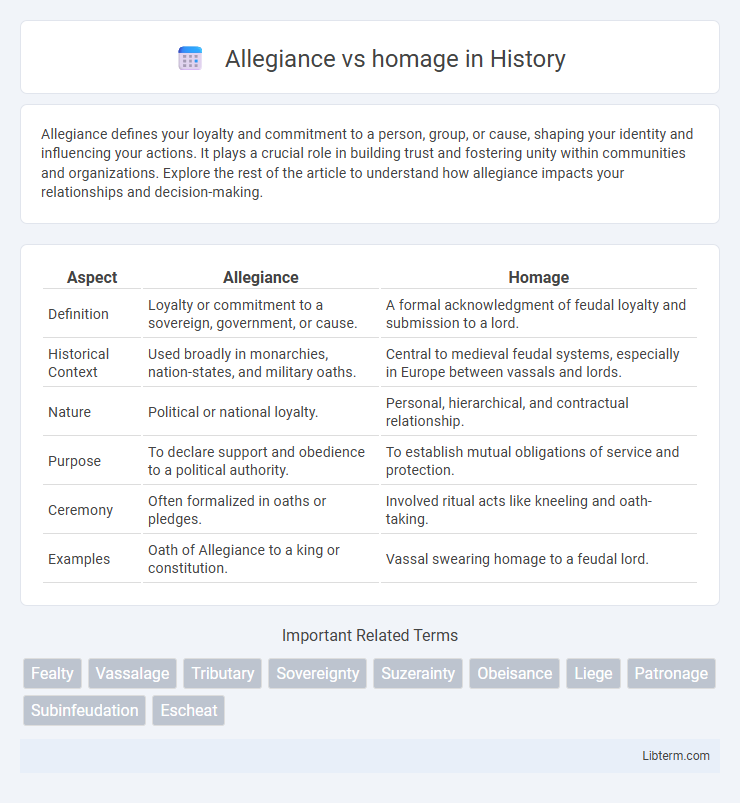Allegiance defines your loyalty and commitment to a person, group, or cause, shaping your identity and influencing your actions. It plays a crucial role in building trust and fostering unity within communities and organizations. Explore the rest of the article to understand how allegiance impacts your relationships and decision-making.
Table of Comparison
| Aspect | Allegiance | Homage |
|---|---|---|
| Definition | Loyalty or commitment to a sovereign, government, or cause. | A formal acknowledgment of feudal loyalty and submission to a lord. |
| Historical Context | Used broadly in monarchies, nation-states, and military oaths. | Central to medieval feudal systems, especially in Europe between vassals and lords. |
| Nature | Political or national loyalty. | Personal, hierarchical, and contractual relationship. |
| Purpose | To declare support and obedience to a political authority. | To establish mutual obligations of service and protection. |
| Ceremony | Often formalized in oaths or pledges. | Involved ritual acts like kneeling and oath-taking. |
| Examples | Oath of Allegiance to a king or constitution. | Vassal swearing homage to a feudal lord. |
Understanding Allegiance: Definition and Context
Allegiance refers to the loyalty or commitment an individual pledges to a sovereign, nation, or cause, often involving a formal or legal obligation. It differs from homage, which is an act of respect or honor typically expressed through symbolic gestures without the same binding duty. Understanding allegiance requires recognizing its role in political and social structures where fidelity supports governance, national unity, and legal responsibilities.
What Does Homage Mean? A Semantic Breakdown
Homage means expressing respect or honor towards someone, often through symbolic actions or gestures that recognize their authority, influence, or achievements. It semantically centers on voluntary acknowledgment and reverence, reflecting personal or communal esteem rather than obligatory loyalty. Unlike allegiance, which implies a formal commitment or loyalty to a person, group, or cause, homage emphasizes admiration and tribute without necessarily involving binding duties.
Allegiance vs Homage: Key Differences
Allegiance involves a formal and binding commitment of loyalty to a sovereign, nation, or leader, often requiring obedience and support. Homage is a ceremonial expression of respect or honor, typically without the legal or political obligations associated with allegiance. The key difference lies in allegiance's legal and political obligations, whereas homage emphasizes symbolic respect or tribute.
Historical Origins of Allegiance and Homage
Allegiance and homage both trace back to medieval feudal systems, where allegiance emerged as a personal loyalty oath between vassals and lords, establishing political and military support. Homage originated from the Latin term "homo," meaning man, symbolizing a vassal's formal acknowledgment of subservience and respect to a lord during a ceremonial act. These historical origins highlight allegiance as a broader concept of loyalty, while homage specifically denotes a ritualized expression of fealty within the feudal hierarchy.
Legal and Social Implications of Allegiance
Allegiance entails a formal loyalty to a sovereign or state, often carrying legal obligations such as oath-taking, tax compliance, and military service, which directly impact one's citizenship rights and duties. Homage is a traditional, often ceremonial expression of respect or honor without binding legal commitments. The legal implications of allegiance influence social identity, political participation, and civic responsibilities within a structured legal framework.
Symbolism Behind Paying Homage
Paying homage symbolizes deep respect, loyalty, and veneration often directed towards a person, deity, or cultural tradition, embodying an act of recognition rather than submission. Unlike allegiance, which implies a binding commitment or loyalty to a sovereign or cause, homage carries ceremonial and symbolic significance rooted in honor and tribute. Historical contexts, such as feudal Europe, illustrate homage as a public acknowledgment of a lord's authority without necessarily equating to personal allegiance.
Allegiance in Modern Society
Allegiance in modern society represents a committed loyalty to a nation, organization, or cause, often formalized through oaths or pledges such as the Pledge of Allegiance in the United States. This concept fosters social cohesion and political stability by uniting individuals under shared values and legal frameworks. Unlike homage, which is rooted in historical feudal traditions and personal homage to a lord, allegiance emphasizes collective identity and civic responsibility in contemporary democratic contexts.
Rituals and Ceremonies: Expressing Homage
Rituals and ceremonies expressing homage often involve symbolic gestures like bowing, offering gifts, or reciting oaths to honor a person, deity, or tradition, reinforcing social bonds and respect. These acts differ from allegiance rituals, which emphasize loyalty and commitment to a sovereign or cause through formal pledges or salutes. Homage rituals prioritize reverence and acknowledgment of status or sanctity, embedding cultural values and collective memory into communal practices.
Allegiance vs Homage in Popular Culture
Allegiance in popular culture often represents loyalty and commitment to a group, nation, or leader, symbolized through flags, anthems, or oaths in films and literature. Homage typically refers to acts or works that show respect or honor to previous creators, styles, or icons, seen in movies, music, and visual arts as subtle references or direct tributes. The distinction between allegiance and homage highlights loyalty and respect's different expressions within cultural narratives.
Choosing Between Allegiance and Homage: When and Why
Choosing between allegiance and homage depends on the nature of loyalty and the context of the relationship. Allegiance implies a formal, often political or legal commitment to a sovereign or organization, emphasizing ongoing duty and obedience. Homage, rooted in feudal tradition, is a personal show of respect and honor, often symbolic and focused on individual loyalty rather than institutional obligation.
Allegiance Infographic

 libterm.com
libterm.com